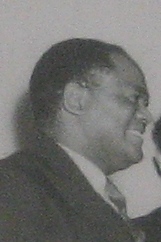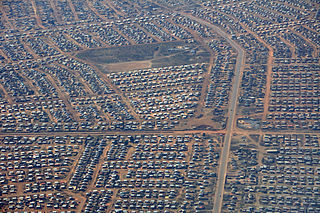
Swahili, also known by its local name Kiswahili, is a Bantu language originally spoken by the Swahili people, who are found primarily in Tanzania, Kenya and Mozambique. The number of current Swahili speakers, be they native or second-language speakers, is estimated to be over 200 million.

A Bantustan was a territory that the National Party administration of South Africa set aside for black inhabitants of South Africa and South West Africa, as part of its policy of apartheid.
Shona is a Bantu language of the Shona people of Zimbabwe. The term is variously used to collectively describe all the Central Shonic varieties or specifically Standard Shona, a variety codified in the mid-20th century. Using the broader term, the language is spoken by over 14,000,000 people.

Zachariah Keodirelang "ZK" Matthews OLG was a prominent black academic in South Africa, lecturing at South African Native College, where many future leaders of the African continent were among his students.

Kavangoland was a bantustan and then later a non-geographic ethnic-based second-tier authority, the Representative Authority of the Kavangos, in South West Africa, intended by the apartheid government to be a self-governing homeland for the Kavango people.

Thokoza, alternatively rendered Tokoza, is a township in Ekurhuleni, Gauteng. Thokoza is at the location of the now-defunct Palmietfontein Airport. It is situated south east of Alberton, adjacent to Katlehong. Thokoza was the first black township which was established in the South. During the early 1990s Thokoza was the middle of unrest between the supporters of the Inkatha Freedom Party (IFP), rival party of the African National Congress (ANC).
The Segeju are a Bantu ethnolinguistic group mostly based in Tanzania's Tanga Region and Kenya's Kwale County. Most Segeju reside in the small coastal strip between the Tanzanian city of Tanga and the Kenyan-Tanzanian border. However, some Segeju have migrated to urban areas in other parts of Tanzania or Kenya, in hopes of better employment opportunities and quality of life. Segeju migration to urban areas often results in severance of community ties, leading to a lack of transmission of important cultural traditions and language.
The system of racial segregation and oppression in South Africa known as apartheid was implemented and enforced by many acts and other laws. This legislation served to institutionalize racial discrimination and the dominance by white people over people of other races. While the bulk of this legislation was enacted after the election of the National Party government in 1948, it was preceded by discriminatory legislation enacted under earlier British and Afrikaner governments. Apartheid is distinguished from segregation in other countries by the systematic way in which it was formalized in law.
The Somali Bantus are a Bantu ethnic minority group in Somalia who primarily reside in the southern part of the country, primarily near the Jubba and Shabelle rivers. The Somali Bantus are descendants of enslaved peoples from various Bantu ethnic groups from Southeast Africa, particularly from Mozambique, Malawi, and Tanzania. The East African slave trade was not eliminated until the early parts of the 20th century.

Ukhozi FM is a South African national radio station & owned by SABC, based in Durban, KwaZulu-Natal that caters to the needs of the Zulu-speaking community. Founded in 1960, it is the largest radio station in South Africa and Africa. The station has a broadcasting licence from ICASA.

The Bantu Authorities Act, 1951 was to give authority to Traditional Tribal Leader within their traditional tribal homelands in South Africa. This legislation, succeeding the Native Affairs Act, created the legal basis for Self Determination of the various ethnic and linguistic tribes into traditional homeland reserve areas and established tribal, regional and territorial authorities. This Act was augmented by the Bantu Homelands Citizens Act of 1970.

The Native Laws Amendment Act, 1952, formed part of the apartheid system of racial segregation in South Africa. It amended section 10 of the Group Areas Act. It limited the category of blacks who had the right to permanent residence in urban areas. While Section 10 had granted permanent residence to blacks who had been born in a town and had lived there continuously for more than 15 years, or who had been employed there continuously for at least 15 years, or who had worked continuously for the same employer for more than 10 years. Non-whites living in urban areas who did not meet these criteria faced forcible removal.

|belowstyle = background-color:#FFCCCC; |below = Status: Repealed }} The Bantu Investment Corporation Act, Act No 34 of 1959, formed part of the apartheid system of racial segregation in South Africa. In combination with the Bantu Homelands Development Act of 1965, it allowed the South African government to capitalize on entrepreneurs operating in the Bantustans. It created a Development Corporation in each of the Bantustans.

The Bantu Homelands Constitution Act, 1971 enabled the government of South Africa to grant independence to any "Homeland" as determined by the South African apartheid government. In accordance with this act, independence was eventually granted to Transkei in 1976, Bophuthatswana in 1977, Venda in 1979, and Ciskei in 1981.

The Representation of Natives Act No 12 of 1936 was legislation passed in South Africa which further reduced black rights at the time. The Cape province had a qualified franchise which had allowed a small number of blacks in the Cape to vote for the common roll in terms of the Cape Qualified Franchise. The qualified franchise dated back to the pre-Union period, when the Cape was a separate British colony; it also excluded poorer white men. The 1936 Act removed blacks to a separate roll – and halted the right to run for office; other earlier legislation removed the qualifications imposed in the Cape on whites.

The Native Trust and Land Act, 1936 in South Africa passed a law that served as the reorganization of its agricultural structures. This followed the recommendations of the Beaumont Commission.
Sidi is a Bantu language of Pakistan and India, related to Swahili. Most of the Sidi community today speaks a regional Indic language, mostly Gujarati, mixed with some Bantu words and phrases, and the current number of speakers is unknown. It was reportedly still spoken in the 1960s in Jambur, a village in Kathiawar, Gujarat, by the Siddi. A survey of regional languages conducted by the government of Gujarat in 2016 reported that the language is in danger of extinction.
The South African Congress of Trade Unions (SACTU) was a national trade union federation in South Africa.

The Tomlinson Report was a 1954 report released by the Commission for the Socioeconomic Development of the Bantu Areas, known as the Tomlinson Commission, that was commissioned by the South African government to study the economic viability of the native reserves. These reserves were intended to serve as the homelands for the black population. The report is named for Frederick R. Tomlinson, professor of agricultural economics at the University of Pretoria. Tomlinson chaired the ten-person commission, which was established in 1950. The Tomlinson Report found that the reserves were incapable of containing South Africa's black population without significant state investment. However, Hendrik Verwoerd, Minister of Native Affairs, rejected several recommendations in the report. While both Verwoerd and the Tomlinson Commission believed in "separate development" for the reserves, Verwoerd did not want to end economic interdependence between the reserves and industries in white-controlled areas. The government would go on to pass legislation to restrict the movement of blacks who lived in the reserves to white-controlled areas.

Achille Emile Meeussen, also spelled Achiel Emiel Meeussen, or simply A.E. Meeussen (1912–1978) was a distinguished Belgian specialist in Bantu languages, particularly those of the Belgian Congo, Rwanda and Burundi. Together with the British scholar Malcolm Guthrie (1903–1972) he is regarded as one of the two leading experts in Bantu languages in the second half of the 20th century.









